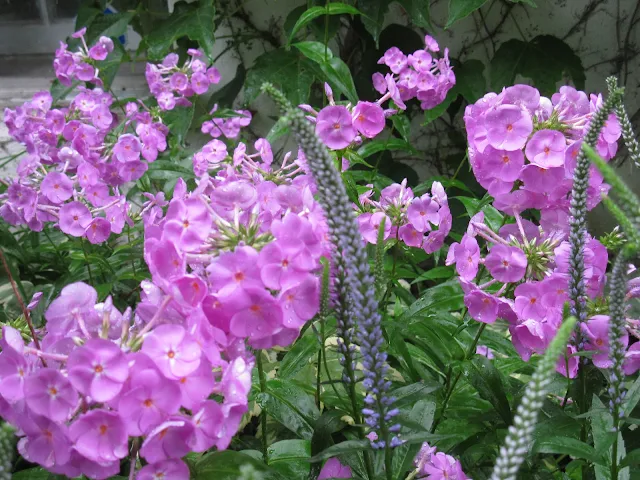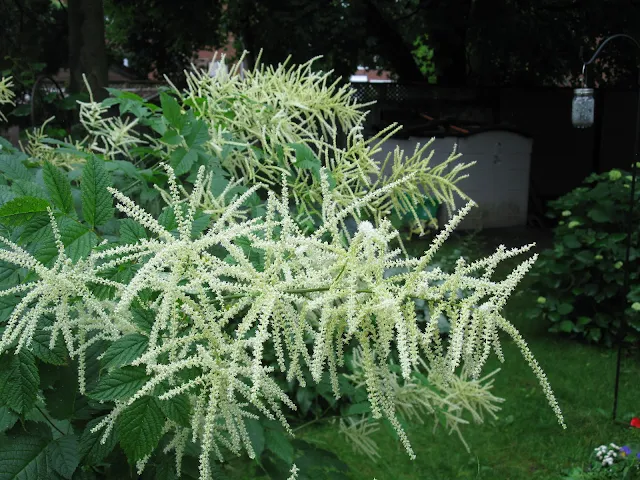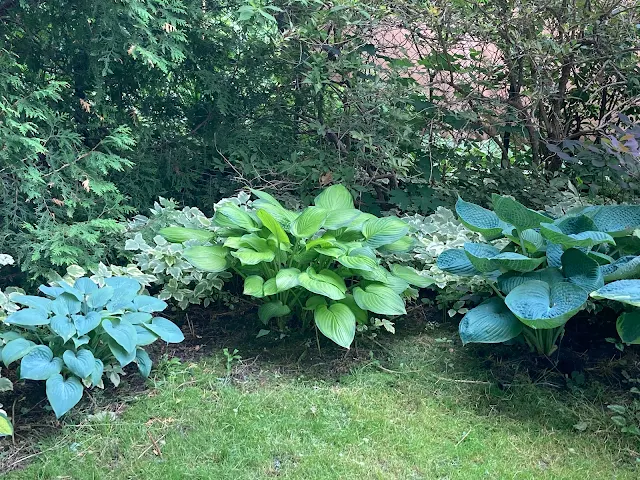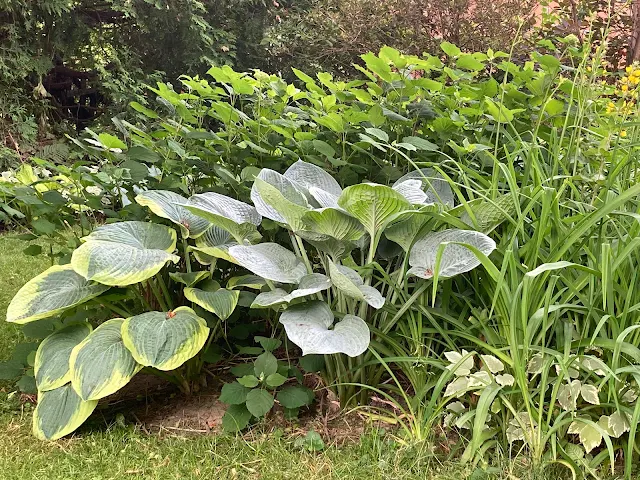Tuesday, June 25, 2024
Monday, June 24, 2024
Fire at the Village Shopping plaza
This was quite a large fire at the Village Shopping Plaza, over a hundred firefighters on the scene. Photographs taken on 20 May 2024.
Saturday, June 22, 2024
"June Rain" by Richard Aldington
.JPG) |
| June 2009 |
The sun rasped with his golden tongue
The city streets, till men and walls shrivelled;
The dusty air stagnated.
At the third noon a wind rippled,
A wide sea silently breaking;
A thick veil of rain-drops
Hid the sun and the hard blue.
A grey garment of rain,
Cold as hoar frost in April,
Enwrapped us.
Friday, June 21, 2024
Monday, June 17, 2024
Review of Cottage Gardens by Claire Masset
Like William Morris at Red House, the cottager would have respected his site and its history. The plot might feature an ancient fruit tree or two, an inheritance he would have willingly worked around, and no doubt been grateful for. An old shed or lean-to would have been repaired, rather than ripped down and replaced. This culture of thrift and reuse and a regard for nature and the past characterises all cottage gardens, both old and new. The best cottage gardens are richly personal spaces. Every plant and feature tells a story, and the layers of history usually stretch far beyond the present owner's occupancy.-- Claire Masset in Cottage Gardens (2020), p. 45
Claire Masset's Cottage Gardens, A celebration of Britain's most beautiful cottage gardens, with advice on making your own (2020) falls into several categories, it is a reference book, a source of ideas for cottage gardens, a history of the cottage garden, and a book of photographs of cottage gardens. It is a book for gardeners and those interested in cottage gardens. The cottage garden is uniquely British, a part of British history and culture, and an expression of the British soul or inner being; it speaks to values of frugality, tradition, and conserving the best of the past. Published as a National Trust Book, this volume is highly recommended.
Some readers of this book will, like myself, already be gardeners and there are many valuable ideas here for gardening and cottage gardens; it may be something simple like placing pots of flowers outdoors, or that foxglove is a biennial, or that cottage gardens can also include topiary, shrubs cut into the shape of birds or geometric forms; topiary might seem a contradiction to what we think constitutes a cottage garden but it can be fun, whimsical, and is a welcome addition to our usual concept of the cottage garden. In addition to the text are many photographs of cottage gardens, flowers, trees, paths through gardens, bird baths, and cottage gardens of well known literary people; when you can't garden you can at least enjoy looking at photographs of cottage gardens. There is a useful list and discussion of some of the best known cottage gardens managed by the National Trust, for instance gardens that belonged to Thomas Hardy, Beatrix Potter, and Leonard and Virginia Woolf; I followed the links to get more information on these places. Wouldn't it be great to spend a summer travelling and visiting each of these gardens!
There are a variety of approaches to cultivating a cottage garden; some gardeners favour a more traditional garden with abundant displays of various perennials, edges to keep neat, weeding to be done, and some grass to cut; while it would seem others, myself included, favour a garden that is more unruly and closer to a natural environment. I want my cottage garden to be a place that has become a bit of the country here in the city. When I sit in my garden I am always happy; I am surrounded by flowers and I see insects, butterflies, the occasional honey bee, and birds visiting the bird bath, I am proud that I have contributed to this little Shangri-La. But my garden reflects my laissez faire approach to my cottage garden, and is not shared by all.
A cottage garden requires, among other things, water in the form of a bird bath or a fountain, an apple tree or a fruit bearing shrub, mostly perennial or biennial flowers, and Mother Nature is certainly a co-creator of what the garden looks like as our well considered plans give way to what nature decides, that is to say the garden decides how it will look as our garden evolves. Although not writing about the cottage garden, Sir William Temple (1628-1699) suggests that "In every garden four things are necessary to be provided for, Flowers, Fruit, Shade, and Water" and these also belong in a cottage garden; as well, a cottage garden is like an extension of the rooms inside one's home, you look out of the window and see the garden, not a barren square of cut grass, but a place that is inviting and well established with flowers, a bird bath, and a few garden chairs. A cottage garden is somewhat like a sculpture, just as the sculptor removes bits of marble to find the art enclosed inside the marble (as suggested by Michelangelo), one's original concept of one's garden becomes obsolete as the garden and nature asserts its presence; the hand of man falls away as the garden decides how it will express itself.
Of course, Cottage Gardens is a book meant primarily for those interested in the English country garden, it is a "celebration of Britain's most beautiful cottage gardens, with advice on making your own". Here in Canada we have a variation on this, it is what I call the Canadian cottage garden and is largely influenced by the English country garden and by our long winters and shorter growing season. Climate change might be giving us less severe winters, but winter is still very cold. There is a Japanese garden at the Montreal Botanical Garden, wouldn't an English cottage garden be a wonderful addition to one of the largest botanical gardens in North America, this "jewel" of Montreal?
Sunday, June 16, 2024
Saturday, June 15, 2024
Friday, June 14, 2024
Our cottage garden on 9 June 2024, after rain
In about a week or ten days this garden will be full of flowers, then the garden will turn from mostly green to an abundance of colourful flowers.
Wednesday, June 12, 2024
"Degeneration" by F.R. Scott
The first to go are the niceties,
The little minor conformities
That suddenly seem absurdities.
Soon kindling animosities
Surmount the old civilities
And start the first brutalities.
Then come the bold extremities,
The justified enormities,
The unrestrained ferocities.
From Signatures, F.R. Scott,
Klanak Press, Vancouver, 1964



























































